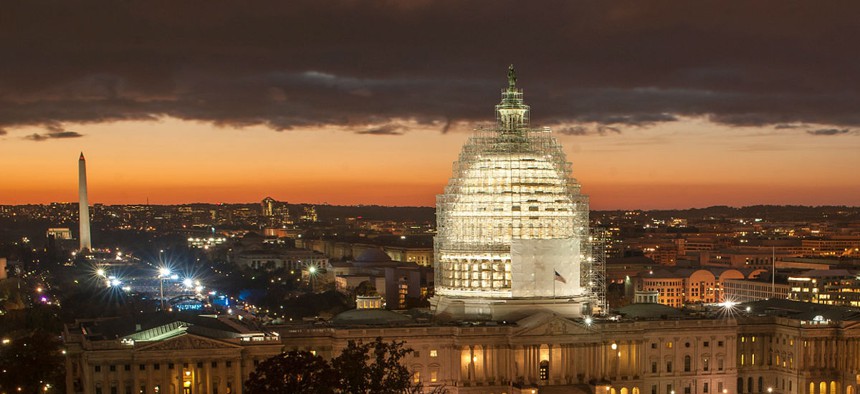
Architect of the Capitol
Senate Approves Massive Spending Measure
Action means most agencies will get full fiscal year funding.
After a hectic process and objections from conservative members that kept senators working all day, the Senate voted Saturday night to approve a $1.1 trillion spending bill that would fund the government through September and tee up a February confrontation with President Obama over immigration.
The chamber voted 56-40 to approve the "CROmnibus," which was passed by the House Thursday night. The White House indicated Obama would sign the measure. The bill exposed divisions in both parties, pitting Democratic leaders against each other in the House and a small band of conservatives against GOP leaders in the Senate.
The Senate voted 77-19 earlier to end debate on the measure—with a small coalition of conservatives and liberals opposed—after Republicans and Democrats struck a deal to speed up a very slow process. The agreement cut short a long day and what had promised to be a long night of drama and tension in the Senate, where many lawmakers were eager to get home or, at the very least, take the weekend off before bringing the historically unproductive 113th Congress to a close.
Following the cloture vote, Sen. Ted Cruz—whose objections to the bill threw the Senate into chaos over the last several days—took to the floor offering a procedural motion to effectively kill the omnibus bill in response to the president's action on immigration. "Tonight is the first opportunity that Congress has to express it's disapproval," Cruz said.
Cruz's point of order failed, with 74 senators—including many Republicans—opposed and 22 in favor.
Nineteen members from all ideological backgrounds also voted to stop the Senate from taking a final vote on the omnibus bill including liberal members like Sen. Elizabeth Warren and Sen. Sherrod Brown, who oppose the measure's changes to the Dodd-Frank law; Cruz and Sen. Mike Lee, who argued for immigration language; and even some moderate Democrats like Sens. Joe Manchin and Claire McCaskill.
Previously, members were expected to take up a procedural motion on the omnibus spending bill at 1 a.m. Sunday with final passage at 7 a.m. Monday, over the objections of Cruz and Sen. Mike Lee. Both chambers have approved a resolution to keep the government funded through Wednesday, so the threat of a shutdown was already off the table.
This isn't the first time rank-and-file members have held up a vote on keeping the government funded. Last year, Cruz helped coordinate a strategy to shut down the government in pursuit of a vote to defund the Affordable Care Act.
Republicans hoped to avert a recurrence, but a last-minute procedural maneuver Friday night by Cruz and Lee blocked the Friday vote and, at around 11 p.m., forced senators to come back Saturday. Obama's executive order allowing visas to be issued to potentially millions of undocumented immigrants has enraged Cruz and other conservatives. Cruz and Lee were demanding a vote to prohibit funds for enacting the immigration action before Jan. 1.
Cruz said he had a one-on-one conversation with Reid on Saturday afternoon in which Cruz said he would allow the cloture vote on the spending package to go forward. But Cruz had a condition: that Reid would allow a constitutional point of order on the president's executive action on immigration to be raised.
"One can only infer," Cruz said, "that the Democrats are afraid of taking a clear vote on the constitutionality of the president's illegal executive amnesty.… If the Democrats continue to refuse to compromise, they will drag this day out until one in the morning."
Cruz's office sought to make the case that his motion was substantive and worth the effort. "Democrats have never been asked to go on record supporting or opposing Obama's amnesty. Tonight, bc of Ted Cruz, they will," Cruz spokeswoman Amanda Carpenter tweeted, adding: "And, keep in mind, the Cruz point of order has teeth. It's not an empty show vote. Essential for holding GOP's feet to the fire next year."
NEXT STORY: Senators Strike Deal to Vote on Spending Measure






